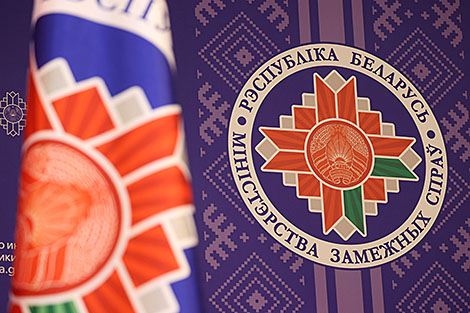Events
MFA: Belarus invites neighboring EU countries to return to cooperation to counter illegal migration

An archive photo
MINSK, 18 September (BelTA) - Belarus continues to invite the neighboring EU member states to return to normal professional cooperation to counter such a big challenge as illegal migration, press secretary of the Belarusian Ministry of Foreign Affairs Anatoly Glaz told BelTA.
In an attempt to curb illegal migration the German authorities re-introduced controls at their external borders, in fact ignoring the Schengen agreement. This caused mixed reactions from the neighboring countries. In this connection, Anatoly Glaz was asked how the Belarusian Ministry of Foreign Affairs sees this situation and its causes.
The official representative of the Belarusian Ministry of Foreign Affairs replied: “In our opinion, these measures on the part of Berlin were a response to the inefficiency of Poland and the Baltic states at the external borders of the European Union in terms of ensuring the migration security of the EU and the main destination country for migrants - Germany. Everyone knows that no fences or other forceful methods can ensure an efficient solution to the issue. All relevant international organizations say that this problem must be solved only through concerted efforts and multi-stakeholder partnerships.”
“The recent telephone conversation between Federal Chancellor Olaf Scholz and Polish Prime Minister Donald Tusk held to discuss migration policy has showed Warsaw's irritation with Berlin's actions. We fully share the approaches Germany and Poland proclaimed to the press about ‘close cooperation between European partners’ in terms of countering illegal migration,” the spokesman for the Belarusian Ministry of Foreign Affairs said.
He went on saying: “Another attempt by Berlin and Warsaw to accuse Belarus of some kind of instrumentalized migration does not stand up to any criticism, however. Less than half a percent of all migrants who make it to the EU get there through our country. We have repeatedly offered the neighboring EU member states to return to usual professional cooperation to counter this big challenge. We are still committed to the cooperation, if they are really concerned about this issue."
Anatoly Glaz pointed out: "We are still struggling to understand why hundreds of thousands of disadvantaged people who arrive in the EU through the Balkan, Mediterranean and other routes are migrants who need to be rescued and accepted and why a few thousand migrants who enter the EU through Belarus are ‘instrumentalized’ migrants who can be killed and maimed at the border?”
"It is difficult to find a proper explanation to this outrageous cynicism and double standards," he summarized.







 print version
print version make home page
make home page add to bookmarks
add to bookmarks

